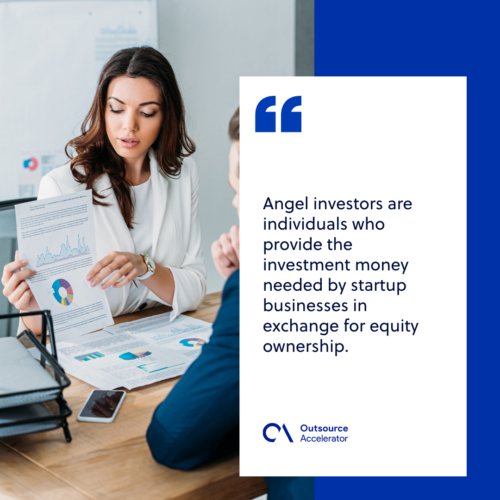Angel investor
Definition
What is an angel investor?
Also called angel funders or simply angels, angel investors are individuals who provide the investment money needed by startup businesses in exchange for equity ownership. These investors are typically high-net-worth individuals from entrepreneurial backgrounds.
Angel investors usually seek businesses or companies at the earliest stages of starting up. While these investments are risky, they typically equate to no more than 10% of the angel investor’s portfolio.

Who can become angel investors?
Technically, anyone with enough financial capability can become an angel investor.
In the US, individuals can also apply for an “accredited investor” status from the Securities and Exchange Commission (SEC). The SEC grants the accredited investor status to individuals with at least USD 1 million in assets, excluding personal residences.
People with an earned income of at least USD 200,000 for the past two years, or a combined income of at least USD 300,000 for married couples, can also apply for an accredited investor status.
However, an accredited investor status is not a requisite for being an angel investor, nor is it necessarily synonymous with being one.
How do angel investors work?
Angel investors generally show up during a startup business or company’s earliest stages, including even when the startup is no more than an idea. These early phases are sometimes known as the “angel” or “seed” phases.
Angel investors could also get involved after the startup has been initially funded by its founders.
Once the angels have connected with a startup, the investment process executes as follows:
- Angel investors contact startups through various means, such as professional referrals, word of mouth, online business forums, or industry seminars and conventions.
- If both parties show interest, the angel investor will begin conducting due diligence on the startup.
- A contract will be drawn up if the angel investor is satisfied and a verbal agreement is in place. The contract draft will contain the terms of investment, investor rights and protections, control parameters, payout or equity percentage, and an exit strategy for the angel investor.
- After finalizing the contract, an actual legal copy will be furnished and signed. The deal is then closed, and the funds will be transferred to the startup.
Investments from angels differ, ranging from as low as USD 5,000 to as high as USD 150,000. There are also angel investors who form groups that can churn out funds as large as USD 1 million.
While angel investors take equity shares in exchange for their investments, they usually refrain from acquiring more than 25% of the stakes in a company. This strategy serves to incentivize the startup founders to strive for the company’s success.

Where to find angel investors
Startup owners seeking angel investors to fund their companies can search on the following online platforms:
- Angel Investment Network
- Angel List
Local business organizations can also help in directing startups to potential angel investors.
Advantages and disadvantages of angel investors
Getting funds from angel investors instead of venture capitalists is advantageous for startup companies. However, angel investments also have their share of drawbacks.
Advantages of having angel investors:
- Angel investors are more committed to a company than regular investors and are more likely to make additional fund injections.
- Startups funded by angel investors face less paperwork from the SEC and other regulators than companies funded by regular investments.
- Startups are also not legally bound to pay their investors back if their business venture flops.
- Angel investors, more often than not, are also entrepreneurs with a wealth of knowledge and experience.
Disadvantages of having angel investors:
- Startups may end up with a novice investor who gives terrible advice and pesters the company owners for constant updates.
- Startup owners have decreased control over their company as angel investors demand equity shares as payment for their investments.
- Equity shares can end up being more expensive than paying debt from venture capitalists.







 Independent
Independent




